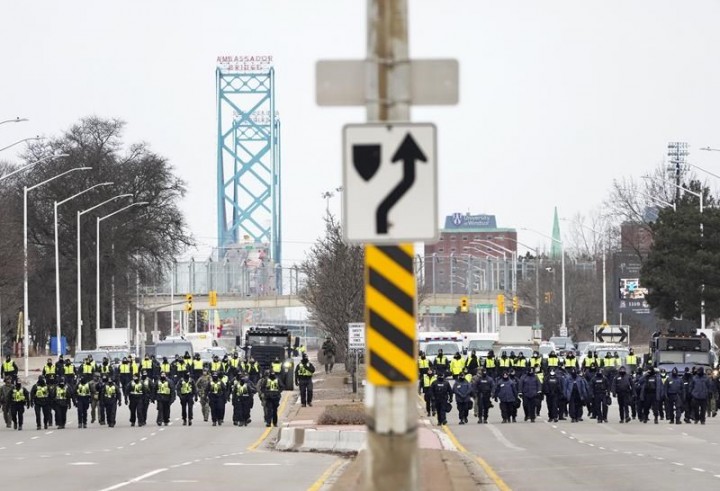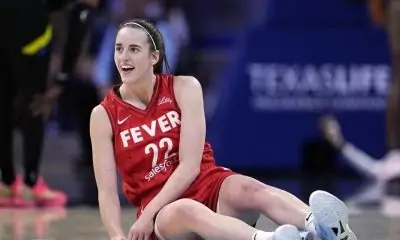SAO PAULO (AP) — “King” doesn’t disclose his real name. Even clients of his Sao Paulo newsstand have to call him by his moniker. The Brazilian online sports gambling addict lowered his profile after a loan shark threatened to put bullets in his head if he didn’t pay up.
Broke and embarrassed, King sought treatment and support earlier this year.
“I was once addicted to slot machines, but then sports betting was so easy that I changed. I got carried away all the time,” he told The Associated Press.
King’s story is that of many vulnerable Brazilians in recent years. The country has become the third-biggest market in the world for sports betting, following the U.S. and the U.K., a report by data analysis company Comscore said last year. But unlike those countries, rampant advertising and sponsorship have been coupled with an unregulated market. The government is now — belatedly, some say — striving to get a handle on the epidemic.
On a recent evening, King’s Gamblers Anonymous meeting took place in an improvised classroom inside a church, with coffee and cookies to keep everyone awake, and supportive messages scrawled onto the blackboard. One that’s become ubiquitous in Brazil and beyond: “Only for today I will avoid the first bet.”
King and other attendees, all Christian, started a prayer and the meeting began.
King said his financial problems arose from his addiction to online sports betting, chiefly on soccer.
“I miss the adrenaline rush when I don’t bet,” he said before the gathering. “I have managed to stop for a couple of months, but I know that if I do it once again, even a small bet, it will all come back.”
Driven by the pandemic
The COVID-19 pandemic was a key driver for Brazilians embracing sports betting. King said he transformed almost every sale during that time into a bet. His hook was the non-stop advertising on TV, radio, social media as well as sponsorship of local soccer teams’ jerseys. He asked for bank loans to pay his gambling debts and then, to cover those, went to the moneylender. His total debt now amounts to 85,000 reais ($15,000) — impossible to pay off with his monthly income of 8,000 reais.
Digging oneself out of debt in Brazil is especially daunting with its sky-high interest rates. Loans from Brazilian banks could add interest of almost 8% per month to the borrowed sum, and from loan sharks could be even more.
Four Gamblers Anonymous meetings attended by the AP in October featured discussions about difficulties paying down debts, forcing working-class members to postpone housing payments and cancel family vacations.
Some members of impoverished Brazilian families have used welfare money for betting instead of paying for groceries and housing, official data suggests. In August, beneficiaries of Brazil’s flagship program Bolsa Familia spent 3 billion reais ($530 million) on sports betting, according to a report from the central bank. That was more than 20% of the program’s total outlay in the month.
A host of gambling related problems
Sports betting was made legal in 2018 in a bill signed by former President Michel Temer. The subsequent turmoil has recently been setting off alarm bells, with addicts venting on social media and media reports of people losing huge sums.
On Oct. 1, the economy ministry prevented more than 2,000 betting companies from operating in Brazil for having failed to provide all the required documents. Soccer-loving President Luiz Inácio Lula da Silva said in an interview on Oct. 17 that he will shut down the entire market in Brazil if his administration’s new regulations — presented at the end of July— fail to work. And Brazil’s Senate on Oct. 25 opened an investigation into betting companies, focusing on crime and addiction.
“There’s tax evasion, money laundering of organized crime, the use of influencers to trick people into betting. These companies need to be audited,” Sen. Soraya Thronicke, who proposed the inquiry, told journalists in Brasilia.
Sérgio Peixoto, a ride-sharing app driver in Rio, is one of many lower-middle-income Brazilians who have reduced their spending due to sports betting debt. Peixoto’s debt currently amounts to 25,000 reais ($4,400). His monthly income is four times less than that.
“It stopped being a game, it wasn’t fun. I just wanted to get the money back, so I lost even more,” said Peixoto, 26. “I could have invested that money. It would surely have given me more benefits.
Pressure to bet
Pressure on people to gamble is everywhere. Current and former soccer players, including Vinicius Júnior, Ronaldo Nazário and Roberto Rivellino, are among the poster boys for local and foreign brands. All but one of the top-tier soccer clubs have betting companies among their main sponsors, with their name and logo emblazoned on their kits. There have been cases of kids and teenagers setting up accounts using their parents’ personal information and money, multiple local media outlets have reported.
Brazil’s economy ministry estimates that Brazil’s sports betting market had $21 billion in transactions last year, a 71% increase compared with the first year of the pandemic, 2020.
The ministry’s newly presented regulations include facial recognition systems for gamblers to bet, the identification of a single bank account for transactions involving sports betting, new protections against hackers and the government-authorized domain, bet.br, which will host all betting sites that are legal in Brazil. Once they are in place, come January, between 100 and 150 betting companies will continue to operate in the South American nation.
The changes in Brazil have prompted some companies to take preemptive action. A report by Yield Sec, a technical intelligence platform for online marketplaces, said several betting companies voluntarily restricted their operations in different places after the latest editions of the European Championships and Copa America in the hopes of presenting “the best possible license application face to the Brazilian authorities.”
Magnho José Santos de Sousa, the president of the Legal Gambling Institute, a betting think tank, said Brazil is currently “invaded by illegal websites that have licenses in Malta, Curação, Gibraltar and the United Kingdom.”
De Sousa expressed hope that the new regulations for advertising, responsible gambling and qualification of sports betting companies will transform the country’s deregulated arena into a more serious one that doesn’t exploit the vulnerable.
“The whole operation could turn from water into wine,” he said.
Gamblers Anonymous in high demand
Meantime, the demand for Gamblers Anonymous meetings in Sao Paulo has grown so much in recent years that the weekly gathering, in place since the 1990s, was no longer enough. Many groups have added a second day in the week to help new people recover, mostly sports bettors.
Earlier in October, a group on Sao Paulo’s northern edge admitted a man who was struggling with sports betting and card games. The 13 other people in the room stressed that he wasn’t alone.
“Welcome,” one long-time attendee said, in a greeting that has become a regular for the group. “Today, you are the most important person here.”
___
Dumphreys reported from Rio de Janeiro.





































